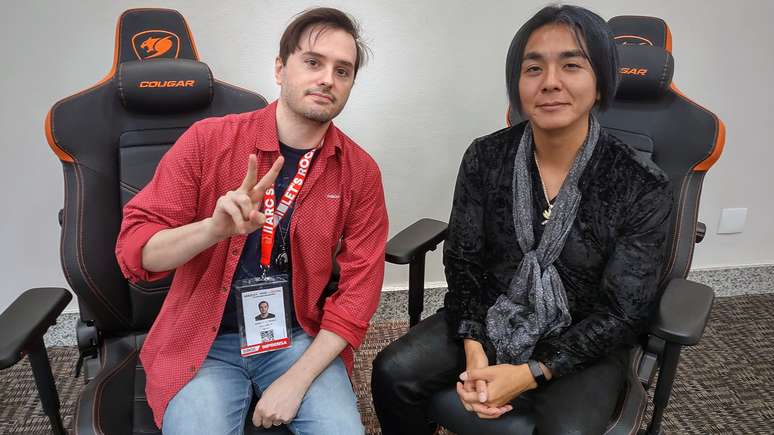The Japanese musician and producer talks about his work with video games during another visit to Brazil
Active game: Shota Nakama, thank you so much for hosting us, welcome once again to Brazil! For starters, you’ve been here in the country a few times, right? What did you discover this time during your stay here in Sao Paulo?
Shota Nakama: This time I couldn’t discover much because I was very busy with the production, but… I drank a lot and discovered new flavors of caipirinhas! (laughs) Seriously, this time I got to work with some amazing Brazilian musicians, I got to discover and learn a lot from them, it was amazing.
Active game: Speaking about yourself, can you tell us how you started your career as a musician, as a producer and later with gaming music?
Shota Nakama: I went to a music school in the US and when I was there I started a project called Video Game Orchestra, to play video game music with an orchestra. At first it was more of a friend thing, but suddenly it became a hit on YouTube, people were calling us for presentations, events and so on. That’s when some friends asked me, “Why don’t you record songs for video games in addition to performing?” and I thought “yeah, that makes sense.” That’s how I got into the video game industry. Initially I didn’t imagine I’d get this far, but things have worked out and as long as I make people happy I’ll keep playing.
Active game: When you started, the idea of mixing video games with an orchestra was strange, but games are increasingly part of popular culture. So do you think public acceptance has also evolved?
Shota Nakama: I think so. When I started there were few video game concerts around the world, so some people at the time thought I was joking, but I wasn’t. But now, all these young players think the shows are the greatest thing in the world. Things have really changed over the generations, I think people accept it better today. I think it’s inevitable, because a lot of people grew up playing video games, so it’s natural for them to look for songs that were related to that. I think that’s why the market is growing.
Active game: And how was Sonic Symphony born?
Shota Nakama: Sonic Symphony started when the Sonic 30th anniversary presentation took place in 2021, it was so good and it was so well received that we discussed “what if we do a live show when this whole pandemic thing is over? ” That’s more or less how it happened, it seemed quite natural for us to develop the idea of doing the shows live, everyone seems to like it, the fans are always there and I’m very grateful that it worked.
Active game: What was it like working for a traditional video game company like Sega?
Shota Nakama: So, I worked for several Japanese and American companies. But working for Sega is obviously an honor. Every company has their own approach to game music, and it’s my job to figure it out, adapt, and make things happen. I love going to their (Sega) office, it’s really cool to see all those games we played and grew up together, the consoles I had, it’s really amazing to see all that.
Active game: Speaking of the more technical aspect, what is briefly your approach to transporting a song from a game to the context of a live show?
Shota Nakama: hm…I’ll put it this way: imagine a song that has already been composed, or that belongs to a rock band, for example. I really don’t like to deviate from the original ideas, especially with the Sonic the Hedgehog songs, because the fans know those songs so well and know what they want to hear. I generally transcribe what’s on the original album, and then start thinking about how to add an orchestra and maximize the emotional impact of a song. Both as an arranger and as a producer, I have all these ideas about how “this will be great in the show, people and the orchestra will like it, so we’ll play with more intensity…” Then I organize these thoughts and they tend to consider the emotional impact of the song and they try to make it even bigger.
Active game: And in this sense, do you think there are big differences between the Western and Eastern ways of composing music for video games?
Shota Nakama: I think there is, yes. I think Western composers tend to be “Hollywood”, you know? More background music, I think it helps you get involved in the game, I think that’s what he’s interested in. As for a lot of Japanese companies in particular, the songs tend to be more melody driven, and if done right that can be a good thing, because at the same time you don’t want to distract players from the game. It’s a fine line and legendary songwriters know how to walk it. I think songs in the East are more catchy, while songs in the West are more background. They consider music to be part of the whole experience, whereas a lot of Japanese companies tend to think of music as an independent element, I mean, they’re still part of the game, but they have more independence.
Active game: And what are your future plans? New shows, projects…
Shota Nakama: With Sonic Symphony, I will focus on expanding internationally, I want to bring the show to more countries. I know the shows tend to happen more in the US now, and it’s my job to bring them to more fans overseas. For my part, I want to keep playing, keep making great music, that’s all I want to do! (laughs) I want to make more people happy.
Active game: So, in closing, would you like to leave a message for your (many) Brazilian fans?
Shota Nakama: First of all I would like to thank all of you who support me. It’s a privilege to be able to return to Brazil so many times to do what I love (drink some açaí and enjoy a barbecue!). Honestly, I think Brazilian fans are amazing, they are very welcoming and respectful… I feel the same vibe as in my hometown… I’m from Okinawa, and there I think people are like Brazilians… ok, with less parties (laughs). I feel like I belong here, it’s amazing. So thank you very much!
Source: Terra
Rose James is a Gossipify movie and series reviewer known for her in-depth analysis and unique perspective on the latest releases. With a background in film studies, she provides engaging and informative reviews, and keeps readers up to date with industry trends and emerging talents.






